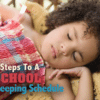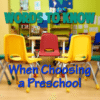As a mother, Rachel has experienced the joys and trials of being a parent. As an innovator in Early Childhood Education, Rachel has seen thousands of parents and their children succeed by adopting her parenting philosophies of consistency, nurturing, and everyday learning. She’s here to answer any and all of your questions!
Click any question to see Rachel’s answer, or ask her your own question here.
First and foremost, is the facility secure? How do visitors enter and exit the building? Is there anytime during the day the entrances are unlocked? What secure drop-off and pick-up policies are in place? If you question your child’s safety, walk the other way.
Secondly, is the facility orderly and clean? This speaks volumes. Children, as well as adults, do not do well in chaos. If the room is ordered, so is the teacher. If the room is clean, it lets you know that management finds this important and is willing to spend the money to make sure the facility is clean each and every day.
Finally, look at the children in attendance. Are they happy, engaged, and challenged? If you can answer yes, yes, yes, then you have a win, win, win
Screens have been a godsend for children with learning disabilities, so they can be very valuable tools. My team has highlighted some of the best educational apps here.
When you’re aware of a conflict, stop what you’re doing and address it immediately. Screaming your warnings at the top of your lungs from another room will not work. This is a great opportunity to help your children learn to verbalize their feelings and engage in healthy conflict resolution.
Why do children fight?
- Boredom
- Get a reaction from the other child
- Get your attention
If you can figure out why your child is acting out, then you can better address the real issue.
There is a fine line between bribing and rewarding, but at the end of the day…bribing is about holding the “carrot” to accomplish a desired result. Whereas, a reward is not usually predetermined, but it can be. The ultimate reward is to nurture a child’s own self esteem and pride for their accomplishments without having to hold the “carrot.”
For further information on this subject, I recommend this article from EmpoweringParents.com.
You are your child’s advocate. My first suggestion is to address the situation directly with the teacher. Be honest about your son’s strengths and weaknesses. Without getting defensive, listen carefully to how she responds to your concerns. Together, devise a strategy that might help resolve the struggle. Make sure she knows you support her authority in the classroom. However, your child’s negative feelings about school are unacceptable. If the situation doesn’t improve, go to the administration and request your child be placed in a different class. It’s important your child has a positive experience in the classroom.
As a preschool administrator, I knew my teachers really appreciated money. Often the class mother would call the other parents and collect a specific amount from each. Sometimes parents didn’t want to participate and that was their decision. A heartfelt letter is also a lovely choice. As a teacher, I often sat and read those letters on a day I needed an extra lift. The only bad gift that’s fairly common is a Teacher mug. There’s only so much coffee one can drink and hot beverages are normally not allowed in the classroom. Skip the mugs!

 What Kindergarten Teachers Are Looking For In Your Child
What Kindergarten Teachers Are Looking For In Your Child 7 Steps to Get Your Child on a School Sleeping Schedule Now
7 Steps to Get Your Child on a School Sleeping Schedule Now Use Books & Videos to Prepare Your Child for Preschool
Use Books & Videos to Prepare Your Child for Preschool Words to Know When Choosing the Right Preschool
Words to Know When Choosing the Right Preschool Pick the Perfect Preschool Backpack and Lunchbox
Pick the Perfect Preschool Backpack and Lunchbox
Dear Rachel,
One of my child’s teachers is overly negative towards him and his classmates. What’s the best way for me to address this?